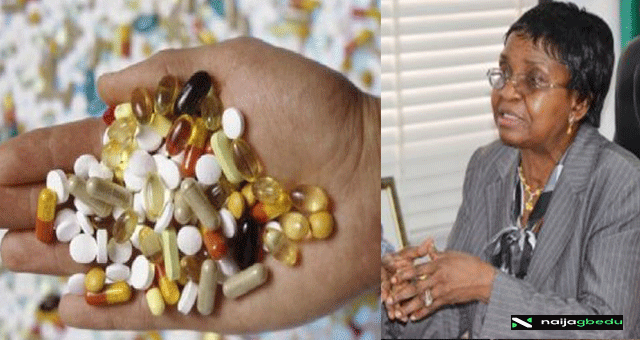News
NAFDAC debunks claim that 70 per cent of drugs in Nigeria are fake

The National Agency for Food and Drug Administration and Control (NAFDAC) has refuted reports that 70 per cent of medicines in Nigeria are fake. In a press statement released today Friday April 26th, the Director General of the Agency, Professor Moji Adeyeye, said that the false report was published by Vanguard Newspaper.
Adeyeye described the report as “categorically untrue and grossly inaccurate,’’, stressing that a study jointly carried out by NAFDAC, the World Health Organisation (WHO) and the Department for International Development (DFID) in 2005 revealed that fake medicines in Nigeria stood at 16 per cent.
She further claimed that a survey conducted by NAFDAC in 2017 and 2018 on some widely used drugs showed that Nigerian medicines were 98 per cent wholesome.
Below is a full statement signed by the NAFDAC Director-General.
“The National Agency for Food and Drug Administration and Control (NAFDAC) wish to inform the members of the public, especially health care providers, policymakers, and development partners to disregard an online publication at https://www.vanguardngr.com that 70% of all drugs in Nigerian markets are fake.
“This is categorically untrue and grossly inaccurate. NAFDAC in collaboration with relevant stakeholders such as World Health Organization (WHO), Department for International Development (DFID) and United States Pharmacopeia conducted series of studies on quality of medicines in Nigeria and the report of these studies are outlined as follows:
A study of Counterfeit and Substandard Medicines in Nigeria conducted by NAFDAC in collaboration with World Health Organization (WHO) and Department for International Development (DFID) in 2005 revealed that counterfeit medicines stood at 16.7% in 2005 as against 40% in 2001.
The National Survey on Quality of medicines using Truscan® device was conducted by NAFDAC across 29 States including FCT, Abuja from January 2010 to April 2012.
The medicines involved in the survey included antibiotics, antimalarials, and antidiabetics. A total of 5,790 samples of medicines were tested.
5,419 samples of medicines out of 5,790 (93.6%) tested during the survey passed quality tests while 371 samples (6.4%) failed.
Another survey on the quality of medicines was conducted in Lagos State in May 2012 using the Truscan® device.
A total of 235 samples of medicines comprising antimalarials, antibiotics, antidiabetics, and anti-inflammatory agents were tested.
226 samples of 235 (96.2%) passed the quality test while 9 samples (3.8%) failed.
The report of the survey on quality of antimalarial medicines conducted by NAFDAC in collaboration with National Malarial Elimination Program (NMEP), National Supply Chain Management Program (NSCMP) and the United States Pharmacopeia (USP) presented on 11th August 2015 revealed that:
771 samples (96.4%) out of 800 samples of antimalarial medicines passed.
29 samples (3.6%) out of 800 samples of antimalarial medicines failed.
The samples of medicines for Round Two (2) survey on the quality of antimalarial medicines conducted by NAFDAC in collaboration with USP were procured between April and May 2016. The report of Round Two (2) survey was presented to stakeholders on the 11th April 2017.The report showed the level of substandard antimalarial medicines in circulation to be 4.33% (39 out of 900 samples) as against 3.6% in 2015.
The samples of antimalarial medicines for Round Three (3) of the survey were procured between February and March 2017. The report of Round 3 survey presented to stakeholders on 12th December 2017 revealed that 883 out of 897 samples of antimalarial medicines (98.4%) passed quality tests while 14 samples (1.6%) failed.
The samples of antimalarial medicines for Round Four (4) survey were procured in August 2017. The report of Round 4 Survey presented on 12th December 2018 revealed that 727 (98.1%) of samples passed laboratory analysis while 14 (1.9%) failed.
The report of Round Five (5) Survey on quality of antimalarial medicines presented to stakeholders on 13th March 2019 revealed that 895 out of 907 samples of antimalarial medicines (98.7%) passed quality tests while 12 samples (1.3%) failed.
The report of series of studies conducted by NAFDAC in collaboration with relevant stakeholders outlined above established that the online publication in Vanguard has no scientific basis, untrue and grossly misleading and as such it should be disregarded.
One of the focus and priority areas of my administration is reducing substandard and falsified drugs through an emphasis on local manufacturing. Promotion of local manufacturing has been on my priority list. This is to reverse the trend of 30% locally manufactured drug products toward 70%. It has been documented that ordinarily, most of the SFs are imported due to the fact that access and fastness to inspect local companies are quite spontaneous and therefore locally produced registered pharmaceuticals are of good quality.
Local manufacturing ensures drug security, reduces unemployment and increases contribution of the pharmaceutical industry to the nation’s GDP
A disclaimer statement is written below distancing NAFDAC from Christabel International Organisation who organized the said meeting and the untrue statements.
DISCLAIMER
The attention of the Agency has been drawn to a publication dated 19th April, 2019 by the Vanguard newspaper titled “70% of drugs in Nigerian markets are fake”.
The National Agency for food and drug Administration and Control (NAFDAC) hereby states that the Agency was never a party to any sensitization workshop organised by Christabel International Organisation at Onitsha for the National Association of Patent and Proprietary Medicine Dealers (NAPMED), wherein it was claimed that 70% of Drugs in Nigeria are fake. For avoidance of doubt, NAFDAC is hereby unequivocally refuting her participation/Involvement in the said workshop.
The agency hereby wishes to inform the general public that the fight against the menace of fake drugs and other unwholesome NAFDAC regulated products is something that the Agency considers as an utmost and daily routine activity.
All NAFDAC’s Directorates are on their toes to ensure that our country Nigeria is free of fake drugs and other unwholesome NAFDAC regulated products.
The public is hereby implored to disregard the publication in Vanguard Newspaper of 19th April 2019.”




